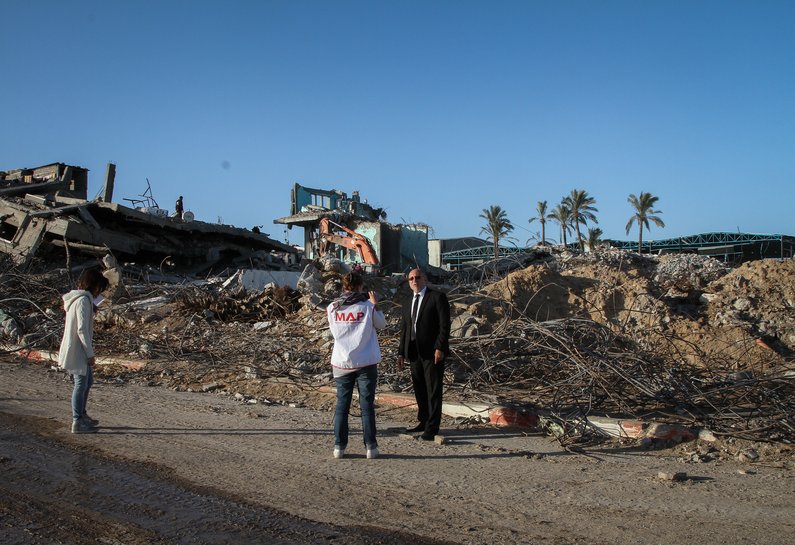Healthcare under attack testimonies: Al Wafa hospital beyond the bombs

Last week, Basman Elashi, Executive Director of the Al Wafa Rehabilitation Hospital in Gaza, which was destroyed in 2014, joined us by Skype to present at the United Nations on the topic of continuing impunity for attacks against medical facilities and personnel. Here are some excerpts from his speech to the attendees at MAP's Human Rights Council side event on Health Under Occupation:
“Three years since the last attack, we in Gaza are still suffering the impact of the 2014 hostilities, especially on the health sector.
In July 2014, even before the Israeli offensive, the Palestinian Ministry of health (MoH) and the world health Organization (WHO), warned that Gaza’s struggling health sector faced imminent collapse due the severe shortage of medical disposables and fuel, and the lack of capacity to extend services to meet population needs. In the days and weeks following that warning, the health sector was confronted with over 11,200 injuries, among them more than 3,800 children, the highest number of injuries in such a short period of time that the Gaza health system has ever experienced.
This has placed enormous stress on the remaining facilities and staff, and the resulting challenges to the health system have continued into the present – and will do so into the future.
About two-thirds of all orthopaedic injuries treated at Gaza hospitals resulted in permanent disability and require rehabilitation. More than 900 of the injured in 2014 sustained some form of permanent disability requiring ongoing attention. Many others are still waiting for medical rehabilitation, such as stroke patients. But where can they get these services? El Wafa Hospital was the only hospital that provided comprehensive medical rehabilitation in Gaza. Its destruction meant the loss of all its medical equipment, medicines and buildings.
El Wafa hospital was subjected to a sustained bombardment by the Israeli Occupation forces. Under the intense pressure, fear and panic suffered by our patients and medical staff from the relentless shelling of our hospital, and direct strikes causing fire and power loss, we evacuated all compounds of the hospital, in the middle of the night. Our patients were evacuated one by one, under fire, in whatever vehicles we could find – some had to be laid on the floor of a van with no medical equipment available, let alone emergency equipment, and driven through streets being shelled by tanks, at enormous risk to them and their rescuers.
Today, although El Wafa Hospital has been operating from a temporary location since August 2014, it lacks much essential equipment and medicines. We try to provide as many services as we can to ease the pain and the suffering of the injured, the disabled and the poor who come every day, either following referral from a local hospital for ongoing treatment or rehabilitation, or because they have no other place to go for medical rehabilitation help.
Health is impacted by more than just the attacks on the buildings or the personnel. It is also impacted by the social and economic deprivation caused by the blockade, which prevents economic development, causes widespread unemployment, and hinders all attempts to seek work or study elsewhere.
El Wafa hospital cannot and will not refuse medical treatment for any patient, regardless of their ability to pay.
Because Israeli authorities permit some medicine to enter Gaza does not mean it reaches all patients who need it. Many patients in Gaza are unable to purchase their medications, especially women and children who lost their main financial support and source of income.
Patients are extremely grateful to the foreign medical volunteers who enter Gaza to give special treatment to needy patients, but the financial burden on individuals and families for follow-up care and medications is often just impossible for them to bear because of rampant unemployment – with an unemployment rate of over 42% the chances of a person with disabilities finding a job and maintaining ongoing rehabilitation are minimal, locking them into a cycle of poverty and deprivation.
Health is impacted by more than just the attacks on the buildings or the personnel. It is also impacted by the social and economic deprivation caused by the blockade, which prevents economic development, causes widespread unemployment, and hinders all attempts to seek work or study elsewhere. These problems in Gaza affect every home, and the health of every man, woman and child.
Let us look not only at the problems facing health services in Gaza, but also at the main causes that create them.
Without accountability - for historic crimes, the crimes of 2014, and the on-going crimes of occupation, settlement building, and particularly the Gaza siege - there can never be a “healthy” Gaza.
Impunity for the 2014 Israeli attacks on healthcare is not only a gross injustice for the victims, but also sends a message that no place is safe for the building of a new hospital, no doctors or nurses are safe to treat the patients, and no ambulance is safe to transport injured patients to hospitals.
If the international community fails once more to respond to the crisis of Gaza’s health situation, it risks further eroding the most fundamental norms of international humanitarian law.”
You can read our latest briefing on attacks on healthcare in Gaza, Health Under Occupation: Protection for Healthcare, and learn how you can take action here.
Related content

